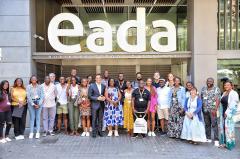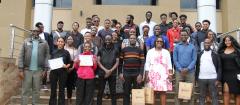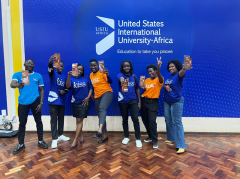SPEECH BY THE CHIEF GUEST, DR. KEVIT DESAI DURING THE USIU-AFRICA @ 50 GALA DINNER AT VILLA ROSA KEMPINSKI ON NOVEMBER 8, 2019
The Board of Trustees, the Chancellor, Dr. Manu Chandaria, the University Council, the Vice-Chancellor Prof. Paul Tiyambe Zeleza, the University Senate, the Management Board, Faculty, students, staff and alumni present,
Distinguished ladies and gentlemen,
Good evening.
I am very happy to join you this evening to celebrate USIU-Africa’s 50th Anniversary. This event marks a significant history in the history of the University, especially after the recent commemoration of our 41st Commencement ceremony on September 28, 2019.
In the 50 years since it was established, USIU-Africa continues to attract students from all over the globe while maintaining high quality of education. The University traces its footsteps from a small college in the US to a renowned global name. USIU then set up operations in Africa and started offering courses to a handful of students who would meet at the Mayfair hotel. The university has expanded in leaps and bounds over the last fifty years and today is a true testament to this growth.
Between 1969 and 1970, the University approached the then Ministry of Education in Kenya and also contacted various other government ministries with a view to obtaining authority to start its campus in Nairobi to serve the continent of Africa. This led to the registration of USIU in 1969 under the Companies Act (Cap.486) following an agreement between the Trustees of what was then the United States International University in San Diego, California, and the Kenyan Ministry of Education.
USIU-Africa’s aspirations as an institution of higher learning are in line with the five year Education Plan (2018-2022) that includes priority areas for investments in higher education. The plan proposes the following key objectives:
- Increase the gross enrolment ratio in university education from 7 percent to 15 percent;
- Enhance the quality and relevance of training and research;
- Increase access to STEM programmes to 60 percent of the student population;
- Create opportunities for academic staff to acquire PhDs and appropriate pedagogical skills;
- Establish the Open University of Kenya (30 percent of degree programmes available via e-learning mode by 2022);
- Enhance equity and inclusion in university education, especially for females and students from low-income families; and
- Strengthen governance and management of university education.
It gives me great pleasure to note that these objectives are in line with USIU-Africa’s strategic objectives, and that the University has constantly been working towards their achievement. Some of the areas in which USIU-Africa has demonstrated excellence include:
Quality of education offered
We are in an era where the higher education sector is experiencing significant shifts. These challenges are not experienced in Kenya only but all over the world. In 2015, students in South Africa started the ‘fees must fall movement’ and were demanding that the government must increase funding to universities and to stop student fees increment. In Uganda, Makerere University students are protesting a policy that sanctioned a 15 percent cumulative increment on tuition over the next five years. In Europe, college tuition fees almost doubled and are estimated to be at an all time high making it more difficult for young people to access higher education. Other challenges include budget cuts, low research productivity, leadership and management of universities and lack of qualified faculty are just some of the challenges being experienced today.
Over the years, Kenyan Universities have seen rapid growth in their enrollment numbers, which has greatly affected the quality of education offered. According to a report released by the World Bank, many Kenyan universities do not have sufficient numbers of qualified staff, which undermines the quality of training offered. This has resulted into the increase of teacher-student ratios, which currently stand at 70:1 in several public universities.
USIU-Africa has been able to position itself as a center of academic excellence by ensuring that it puts in place measures to respond to these challenges. For instance, it is one of the few universities with a student to faculty ratio of 1:31, as it seeks to hire more faculty to drive this ratio down. The high quality faculty bring together many years of experience locally and globally. 73% of faculty at USIU-Africa have PhDs compared to a national average of 34%.
Another challenge that the University has sought to improve is in response to the claims that have long been associated with Kenyan universities: that of traditional pedagogical practices that are more theoretical than practical. USIU-Africa has consistently offered its students a practical-led education, which ensures that they are able to better apply the knowledge gained in the solution of real life problems.
Research and technology transfer
Recent statistics show that Kenya is the second research powerhouse in Sub-Saharan Africa, after South Africa. Globally, Africa accounts for the lowest levels of world researchers and scientific publications (less than 3%), and the lowest levels of gross domestic expenditure on research and development (0.5% compared to the world average of 1.7%). The only area Africa claims dubious distinction is in the proportion of publications with international authors. USIU-Africa has ensured that its students have access to some of the world’s leaders in their fields, to state-of-the-art research opportunities and learning laboratories, and campus facilities and academic support designed to ensure they achieve their educational goals. The research productivity of the university is growing rapidly as evident from the number of publications, external grants, and conferences and workshops, all of which have trebled over the past three years.
Qualification of academics
Many countries and higher education institutions suffer from shortages of qualified faculty and insufficient teaching and learning facilities. In Kenya, for example, only 34% of the faculty in the country’s 74 universities have PhD degrees, and many are poorly trained, a problem exacerbated by rising academic fraud including contract cheating for dissertations and predatory journal publications.
To meet the growing demand for qualified academics and the shortfall in PhD holders, universities can address staffing needs in the following ways:
- Expanding master’s and PhD programs to hire their graduates into the system;
- Training Kenyan students abroad;
- Attracting expatriates with the required qualifications (providing higher remuneration packages compared to their Kenyan colleagues); and
- Covering staff gaps through the contracting of academic staff on a part-time basis in other universities, in addition to their work in the primary employing institution.
In so doing, many universities will be able to offer higher quality education to their students.
Innovative pedagogical practices
To further promote the provision of quality education, we are constantly encouraging universities to make teaching more interactive and more practical. This can be achieved through the establishment of Teaching and Learning Centers in all higher education institutions, which will support innovations in teaching, which will facilitate more collaborative learning. The Centre for Excellence in Teaching is one such institution, which has over the years equipped faculty with the necessary tools to ensure that they facilitate active learning in their classrooms.
Internationalization
One of the main problems facing higher education in Africa is unequal internationalization. This is because the continent is not a major player in the lucrative international student market; more African students study abroad than foreign students study in Africa. There is also the age-old problem of intellectual dependence and epistemic extraversion rooted in the histories of colonial and neo-colonial dependence.
However, as the world becomes more interconnected, internationalization is one of the ways that students are prepared to become global citizens, by embedding an international dimension in all aspects of university life.
USIU-Africa is the only university in the region that has dual accreditation in Kenya and the United States of America (USA) by the Commission for University (CUE) and WASC Senior College and University Commission (WSCUC) respectively. This gives advantage to USIU-Africa students as they get an international education affordably in Kenya, in addition to giving students exposure to curricular innovations and global knowledges making them globally competitive. The international nature of USIU-Africa is represented in the diversity of its student and faculty body, which has almost 73 nationalities represented.
I would like to take this opportunity to wish USIU-Africa a happy Golden Jubilee, and wish you all the best as you journey through the next 50 years and beyond. I think I speak for everyone when I say that I have the confidence that USIU-Africa will see even greater success in the years to come.
Thank you and good evening!





